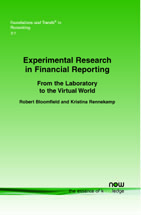Experimental Research in Financial Reporting: From the Laboratory to the Virtual World
By Robert Bloomfield, Nicholas H. Noyes Professor of Management and Professor of Accounting, Cornell University, Johnson Graduate School of Management, USA, rjb9@cornell.edu | Kristina Rennekamp, Graduate Student in Accounting, Cornell University, Johnson Graduate School of Management, USA, kmr52@cornell.edu
Abstract
Virtual worlds can allow experimental researchers to create and examine settings with far more institutional complexity than is possible in a traditional laboratory setting. This document discusses how studies with greater complexity can complement more traditional experimental methods for those who are studying financial reporting; explores both the opportunities and challenges virtual worlds present to experimentalists; presents some examples of how to implement complex institutions; and discusses how the costs and benefits of the virtual-world laboratory vary across different experimental traditions.
Experimental Research in Financial Reporting
Experimental Research in Financial Reporting examines the use of virtual worlds as next-generation laboratories that can help experimental researchers implement features of complex institutions that are not feasible in traditional laboratory settings. This new technology, originally developed for online computer games, lends itself very well to complex economic settings with large numbers of agents interacting through complex institutions for long periods of time. These virtual worlds provide the opportunity to construct settings whose complexity approaches those that accounting researchers wish to study. Since the settings are virtual, researchers can use experimental methods to control and manipulate institutional features (like accounting regulations) and environmental features (such as industry forces) to allow clear causal inferences with limited reliance on econometrics.
